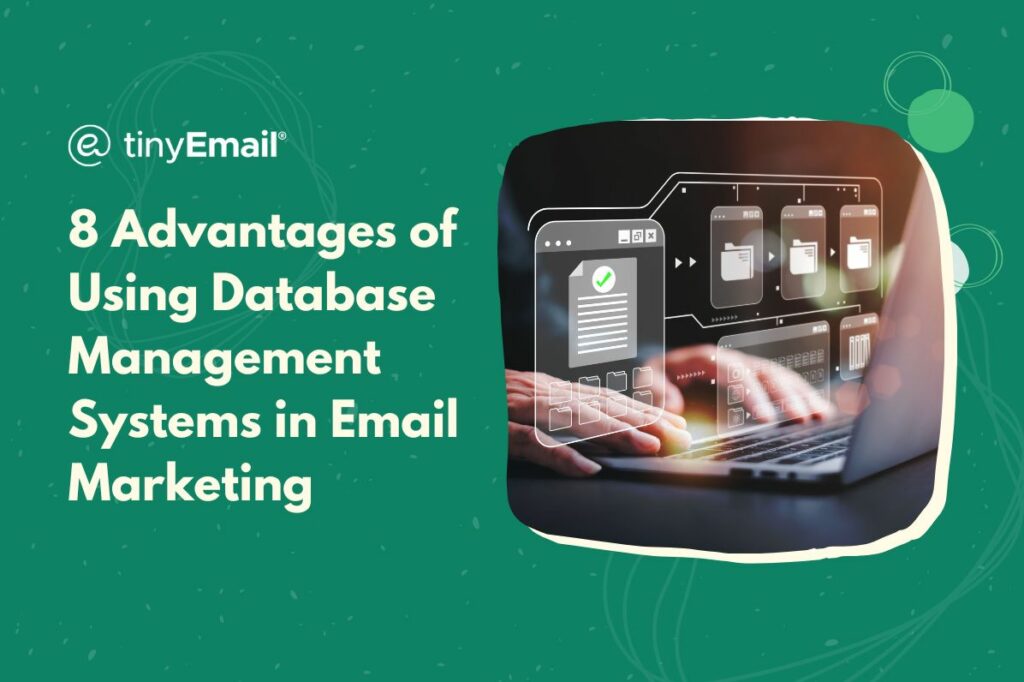A database management system (DBMS) is an application that enables users to manage, organize, and manipulate data in a database. In email marketing, it is used by marketers to store and manage the large amounts of data they acquire from email marketing campaigns both efficiently and securely.
Email marketers across numerous industries choose to leverage database management systems, thanks to the many advantages they provide. If you haven’t decided if a DBMS is right for you, learning about the perks can help you make a choice. Here are the benefits using a DBMS can bring:
Efficient Storage And Management Of Customer Data
A DBMS can store and manage large volumes of customer data, including email addresses, preferences, and behavioral data. This makes it easier for marketers to review and manage data they have, such as email addresses on their email list. With all this data on hand, marketers can easily organize and share it with other members of the company as well.
Customer Segmentation
As your email list grows, it may get harder and harder to categorize such a large group of people. A DBMS can be used to segment customers based on demographic data, interests, behavior, purchase history, and other criteria. This segmentation also helps marketers create targeted email campaigns that are more likely to resonate with customers and then drive conversions.
Improved Data Accuracy And Consistency
A DBMS can enforce data constraints and rules to ensure that the data in the email marketing database is accurate and consistent. This can reduce errors in campaigns, improve deliverability rates, and protect the organization’s reputation.
For example, if you have duplicate email addresses in your email list, the customer may receive duplicates of the email campaign, which can result in a subpar user experience. Using a DBMS can help you spot those errors and sort them out.
Enhanced Data Security
A DBMS can provide robust security features – such as user access control, data encryption, and backup and recovery – to protect customer data from unauthorized access or loss. This can help organizations comply with data protection regulations and build trust with customers and clients.
Automated Email Campaigns
A DBMS can be integrated with email marketing automation software to automate email campaigns based on triggers, such as sign-ups, purchases, and abandoned carts. The software can retrieve customer data from the DBMS and use it to then personalize and send relevant emails automatically, saving the marketer a lot of time.
Integration With Other Marketing Tools
A DBMS can integrate with other marketing tools to provide a comprehensive view of customer data, as well as automate email campaigns. For example, they can integrate with Customer Relationship Management (CRM) tools like Salesforce or HubSpot CRM. This allows marketers to access customer data across various platforms. The integration also helps marketers view and analyze customer interactions with the brand, identify trends, and adjust their marketing strategies accordingly.
DBMS can even integrate with social media management tools, such as Hootsuite or Sprout Social. This enables marketers to create and schedule social media posts that are aligned with email campaigns. As such, marketers can engage customers across different channels and increase brand visibility.
Data Analysis And Reporting
A DBMS can provide tools for data analysis and reporting, such as Structured Query Language (SQL) queries and business intelligence dashboards. This helps marketers gain insights into customer behavior and campaign performance.
Campaign Tracking And Analysis
A DBMS can track and analyze email campaign performance, such as open rates, click-through rates, and conversion rates. This information can be used to optimize future campaigns, improve the targeting and messaging, and increase the ROI of email marketing.
Should I Use Database Management Systems for My Email Campaign?
Using a database management system DBMS can be advantageous for businesses of all sizes and industries. Whether it is right for your specific business, however, depends on various factors, such as:
- Data volume: If your business generates and manages a large volume of data, a DBMS can help you efficiently store, organize, and access the data.
- Data complexity: If your data is complex and consists of many different types of datasets, a DBMS can help you manage and manipulate the data effectively.
- Collaboration: If multiple employees or teams need to access and use the same data, a DBMS can provide a centralized location for storing and managing the data.
- Security: If your business deals with sensitive data – such as customer information or financial data – a DBMS can provide security features, such as access control, encryption, and data backup.
- Cost: Using a DBMS can require an investment in hardware, software, and personnel. If the cost of implementing and maintaining a DBMS exceeds the benefits it provides, it may not be the right solution for your business.
With this information in mind, you can make an informed decision on if DBMS is right for you, and if so, leverage it correctly for your needs.


